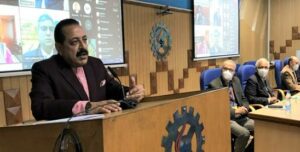 PIB Delhi – Union Minister of State (Independent Charge) Science & Technology; Minister of State (Independent Charge) Earth Sciences; MoS PMO, Personnel, Public Grievances, Pensions, Atomic Energy and Space, said, there is no evidence of declining honey production associated with the cultivation of GM cotton in the country in the last ten years. On the other hand, studies conducted during 2018-19 and 2019-20 indicated that there is no negative impact of Bt transgenic cotton cultivars on bees, brood rearing, pollen and nectar hoarding of Apis mellifera colonies as compared to non -transgenic cotton cultivars.
PIB Delhi – Union Minister of State (Independent Charge) Science & Technology; Minister of State (Independent Charge) Earth Sciences; MoS PMO, Personnel, Public Grievances, Pensions, Atomic Energy and Space, said, there is no evidence of declining honey production associated with the cultivation of GM cotton in the country in the last ten years. On the other hand, studies conducted during 2018-19 and 2019-20 indicated that there is no negative impact of Bt transgenic cotton cultivars on bees, brood rearing, pollen and nectar hoarding of Apis mellifera colonies as compared to non -transgenic cotton cultivars.
In a written reply to a question in the Rajya Sabha, Dr Jitendra Singh said, GM mustard hybrid Dhara Mustard Hybrid-11 (DMH-11) has been tested for three years (2010-11, 2011-12, 2014-15) against national check Varuna and zonal check RL1359 during the confined field trials i.e., Biosafety Research Level (BRL)-I and BRL-II trials at multiple locations. DMH-11 showed approximately 28% more yield than the national check and 37% more than the zonal checks. Dr Jitendra Singh said, Bar gene is responsible for herbicide tolerance and its use has been claimed and approved by the Genetic Engineering Appraisal Committee (GEAC) during hybrid seed production phase to maintain the genetic purity of hybrid seed by killing male fertile plants in female rows in seed production plot only and not during commercial cultivation by the farmers.
On the question of whether any field trial has been conducted to assess the impact on human health, environment, honey bee population and honey production, Dr Jitendra Singh informed that field trials for three years (two years of BRL-I and one year of BRL-II) have been conducted to assess the impact on human health and environment as per the stipulated guidelines and applicable rules. Extensive studies carried out on toxicity (both acute and sub-chronic), allergenicity, compositional analysis, field trials and environmental safety studies of GM mustard lines vs. their non-transgenic comparators have provided evidence that mustard (B. juncea) lines Varuna bn 3.6, EH-2 modbs 2.99 and DMH-11 are safe for cultivation and for food and feed use. Visitation of bees to the transgenic lines is similar to the non-transgenic counterparts as per the data recorded during the BRL-I and BRL-II trials conducted over three growing seasons at multiple locations as per the protocols approved by Review Committee on Genetic Manipulation (RCGM) and GEAC.

